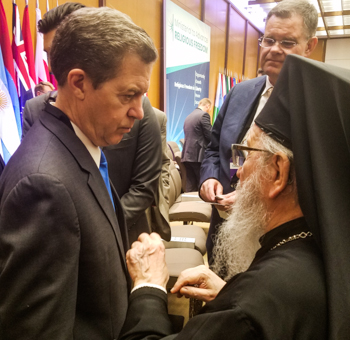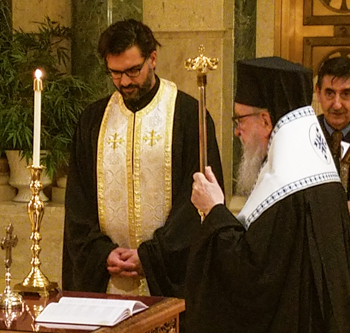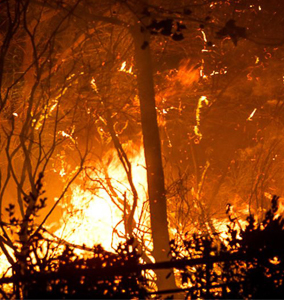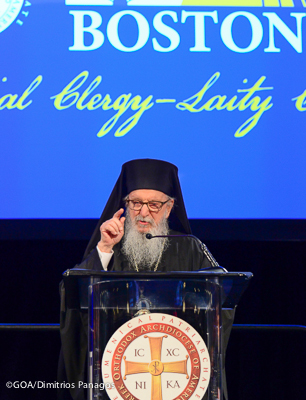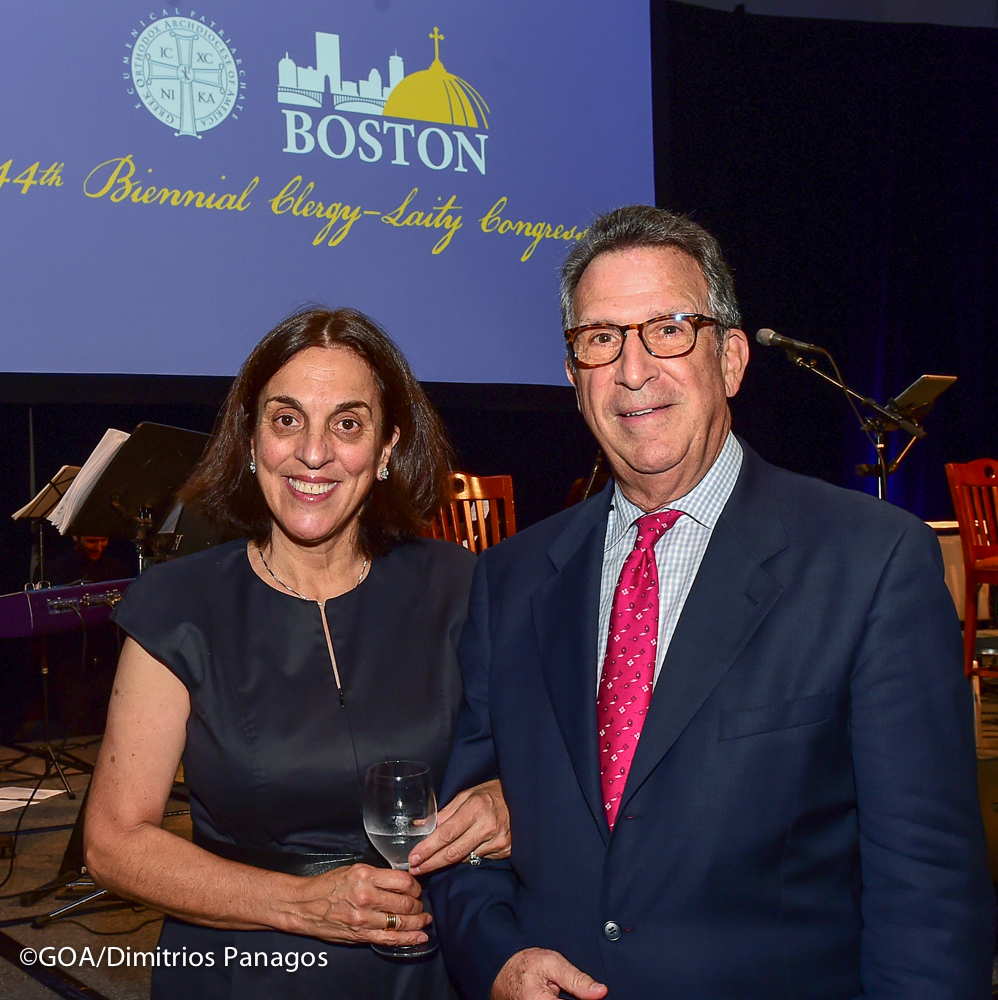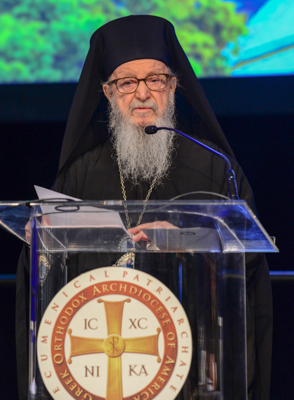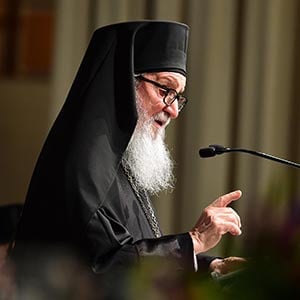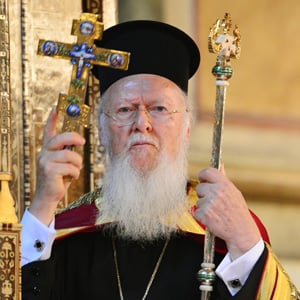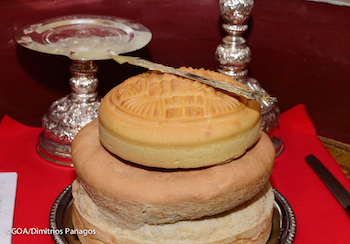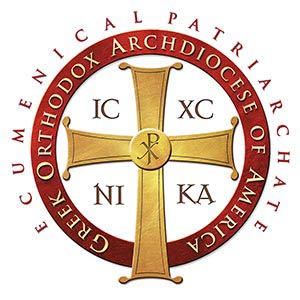Keynote Address of His Eminence Archbishop Demetrios
At the 44th Biennial Clergy-Laity Congress
“All Things Are Possible to the One Who Believes in Christ”
(cf. Mark 9:23)
Δόξα τῇ ἁγίᾳ καὶ ὁμοουσίῳ καὶ ζωοποιῷ καὶ ἀδιαιρέτῳ Τριάδι, πάντοτε, νῦν καὶ ἀεί, καὶ εἰς τοὺς αἰῶνας τῶν αἰώνων.
Glory to the holy and consubstantial, and life giving, and undivided Trinity, always, now and forever and to the ages of ages.
1. With this expression of doxology and thanksgiving to God, we are together again in our 44th Biennial Clergy-Laity Congress. We focus on the theme of this congress, which is, “All Things Are Possible to the One Who Believes in Christ”, as we prepare to deal with the challenges that we face as the Greek Orthodox Church in America, the Eparchy of the Ecumenical Patriarchate in the West. Our theme is based on the words of the Lord, If you can believe, all things are possible to him who believes (Mark 9:23), Who also added: Truly I say to you if you have faith as a grain of mustard seed you will say to this mountain “move from here to there”, and it will move, and nothing will be impossible to you (Matthew 17:20-21). We have been together in Clergy-Laity Congresses since the year 2000 in Philadelphia and then in succession in Los Angeles, New York, Nashville, Washington, Atlanta, Phoenix, Philadelphia, Nashville, and now in Boston, the place of education and democracy.
We express also our wholehearted thanksgiving to His All Holiness our Ecumenical Patriarch Bartholomew for his warm love and abundant blessings, for his very inspirational message that we just heard and for sending to us the distinguished Hierarchs: Metropolitan Apostolos, Geron of Derkoi, and Metropolitan Maximos of Selyvria to represent him at this Congress. Profound thanks belong also to His Eminence Metropolitan Methodios of Boston, the gracious host of this 44th Congress and the people of this Metropolis who offer such an outstanding hospitality.
2. In the period between our last Clergy-Laity Congress in Nashville 2016 up to today, we have had a number of events worth mentioning, but allow me for brevity of time to limit myself first to remember our brothers and sisters that have passed away during this period.
We had the passing of three prominent hierarchs of our Archdiocese, namely, Metropolitan Iakovos of Chicago, and Metropolitan Philotheos of Meloa. A few days ago, Bishop Iacovos of Catania also passed away. In addition, we had the passing of 29 priests and 24 presvyteres of our Archdiocese. We also had quite a number of members from Archdiocesan organizations that joined the Church Triumphant and are no longer with us. So, we count 4 members from the National Board of the Ladies Philoptochos Society, 53 members of Leadership 100, and 61 Archons of the Ecumenical Patriarchate, the Order of St. Andrew. May their memory be eternal, and may they rest in peace and joy in heaven, in the company of the saints and the righteous.
At the same time, we were blessed with the election of the new Metropolitan of Chicago in the person of Archimandrite Nathanael Symeonides, and with many ordinations to the diaconate and to the priesthood. Thus, we had 30 ordinations to the diaconate, and 35 ordinations to the priesthood. During the same period, 16 of our priests retired, 12 clergymen were incardinated to our Archdiocese from various jurisdictions and 8 clergymen were released.
3. As we all know, the major issue that occurred during this period were the difficulties and problems at the Archdiocese and at the building of St. Nicholas Greek Orthodox Church and National Shrine at the World Trade Center.
We have been harmoniously working together in our Greek Orthodox Archdiocese for almost 20 years. During these years, we have encountered—in executing our sacred work—joy, love, harmony, achievement, and unity, but also sadness, hardship, distancing, and apathy. As members of the Orthodox Church, which is the body of Christ (1 Cor. 12:27), we have worked with most sincere dedication in the course of promoting in America the Orthodox Christian Faith, and the universal values of the Hellenic Tradition, as well as having the unique honor of being the living and dynamic presence of our Ecumenical Patriarchate in the Western Hemisphere. During this same period, we gratefully ascertained the fact that, by the grace of God, significant and verifiable progress has been realized in many areas of our Archdiocese.
There have appeared, however, since the 2016 Clergy-Laity Congress in Nashville, unexpected serious economic difficulties and problems and organizational inefficiencies for which we genuinely and deeply regret.
For me, personally as Archbishop, after a long 19-year experience of serving here, and for the entire faithful of the Archdiocese, this dire situation caused truly unbearable pain. This pain resulted from the fact that in spite of the sincere and unselfish offering of work done by many people, we suddenly found threatening before us an extremely difficult and really unacceptable situation. I am truly and deeply sorry for the disappointment, sorrow, frustration and pain that this unfortunate situation brought upon each and every member of our precious and beloved Archdiocese. And I am still refusing to accept and justify the stopping of the building of St. Nicholas. To stop the building of a church, truly monumental and highly symbolic universally for Orthodoxy as is St. Nicholas at Ground Zero is really unthinkable. Tragically, this unthinkable happened.
4. Confronted by this situation of our Archdiocese, we immediately started taking appropriate measures for corrections. Most important among them was a thorough and in depth auditing by external special firms of the finances and management policies and procedures of the Archdiocese and separately of the finances related to the St. Nicholas building activities. As a result of these measures we have already seen—and are continuing to see—positive outcomes, thus gaining better perspectives for future developments. A very important part of correcting these previous inadequacies and deficiencies is the much better arrangement and systemic enhancement of the administrative and financial management of the Archdiocese. We are going to dedicate special time to discuss all relative issues in the forum that will follow this afternoon.
But before that, I would like to publicly express our gratitude to the members of the Executive Committee of our Archdiocesan Council, both our Metropolitans, and our lay people, and particularly, the officers of the Archdiocesan Council. They did an amazing work, offering a huge number of daily and nightly hours in order to make sure that proper procedures and measures are established. I feel it my duty at this point to mention the three officers of the Council, i.e. the Vice-Chair Archon George Tsandikos, the Treasurer Archon Michael Psaros, and the Secretary Dr. Cathy Walsh. In addition to them, sincere thanks are due to the financial committee of the Archdiocesan Council, presided over by His Eminence Metropolitan Methodios of Boston, and chaired by Archon Lou Kircos with the constant assistance of the highly specialized in managerial and auditing affairs Mrs. Elaine Allen, to the Chancellor of our Archdiocese Bishop Andonios of Phasiane, and to the CFO of our Archdiocese Fr. Soterios Baroody. Profound gratitude belongs also to you, clergy and laity brothers and sisters, representing all of our parishes. In spite of the vicious propaganda by enemies of the Church to stop you from offering your regular stewardship allocation to the Archdiocese, you not only continue your important regular allocation but a significant number of you covered partially or entirely in advance the stewardship for the entire year 2018. Such an astonishing dedication reveals the high human and faith quality of our own people like you, which radically differs from the distancing, apathy and even enmity expressed by some individuals. We also thank the numerous people who offered their unselfish and continuous services related to the building of St. Nicholas at the World Trade Center.
Having in mind the picture of what happened and the correcting measures related to it, let us now proceed with the challenges that are confronting us, as we continue our sacred mission of Orthodox presence and witness in the United States.
5. Challenges are not unknown to our Orthodox Christian Church. Please remember what happened to the Early Church at its very beginning. The first Christians in the Apostolic times were a minority of a minority in their era and world; only the 12 Apostles with a small number of people. They did not have any types of schools or seminaries as it so happened with its contemporary Judaism. They did not have strong financial resources. They faced, almost immediately, persecution. For the first three centuries, the early Christians were confronted not only by the reality of persecution, but also with the challenge of overcoming their need for survival and making Christianity a universal religion destined to embrace the whole of humanity.
As we know, what followed after the first three centuries, and the possibility given to Christians to freely practice their faith, was an exponential expansion of the Christian Church all over the world. But here again, in spite of astonishing progress, the Church faced serious challenges; heresies and schisms. The Ecumenical Councils and the local synods, as well as the unique wealth of the writings of the great Church Fathers and theologians are eloquent witnesses of the magnitude and the seriousness of the challenges. Needless to say that persecutions of the Christians continued to occur frequently throughout history reaching the truly unbelievable number of 30 million martyrs only during the 20th century.
Since we are an integral part of the Orthodox Church, we are now facing our own portions of challenges.
6. Challenge 1: The non-stopping change in everything. It is well known that changes happened throughout history. In today’s era, however, changes do not occur every century or every year, or even every month. They occur every hour. Communications, a basic function of human life, have become a matter of electronic media, texting has replaced fully articulated dialogue, knowledge and information has become an issue of googling, twitter and Facebook. The degree of irresponsible, distorted and falsified usage of language and communication has reached such a point of radical change and disconnection from the truth that sociologists and historians say that we have entered in a new era, the post-truth era. Basic institutions like family have been radically altered. A recent statistic, for instance, states that today we have in the United States 21 million children of only one parent. Even shopping is going through a complete transformation dominated by Amazon and online activities. Lifestyles are more and more determined by the lifestyles of various celebrities, regardless of norms of elementary ethics. This whole situation creates a sense of instability and of inability to plan and program things since often times before putting a plan into action the conditions related to it have already changed.
7. Challenge 2: Economic pressure and poverty. Economic pressure and poverty are universal phenomena with serious consequences not unknown to us. For instance, the need for adequate income causes people to work in two professions, in essence pushing family life to a marginal status. We have the sad experience of many family problems being caused by financial pressures. On the other hand, we face phenomena like human trafficking or slavery involving 35 million women and children who are objects of financial labor and pleasure exploitations due to extraordinary conditions of poverty. Certainly, poverty, along with its accompanying consequences, one of them being violence, cannot be ignored by us. And of course, the economic factor has been central as a challenge to our Archdiocese, as we are confronted by the complicated economic difficulties that we experienced in the last year.
8. Challenge 3: Disconnecting from the Church. It has been noticed that in America, but much more so in Europe, the major Christian denominations are losing people. Roman Catholic and Protestant communities, with a few exceptions, see their membership diminishing. People are not becoming atheist or agnostic, but rather they simply do not want to be connected any longer to any organized religious body. We also, as Orthodox Church, are affected by this phenomenon to a certain degree. There are parishes in our Orthodox Church in which this disconnecting attitude occurs. In our case, this happens particularly with a number of mixed marriages and among the young adults. People disconnecting from the Church is an alarming challenge not to be overlooked. Added to some changing demographic conditions, this disconnecting attitude might lead small parishes to extinction.
9. Challenge 4: Attacks against the Christian Faith. The attacks, frequently violent, against the Christian Faith and the proliferation of many religions like Islam, Buddhism, Hinduism and other religio-cultural variations are a major challenge. Atheism today is not what it used to be 30 or 40 years ago. On the other hand, religions other than Christian are becoming more militant and aggressive, not passive and neutral as in the past. Young people of our Faith frequently tell us that in their colleges and universities there are classes and courses in which the presentation and promotion of anti-Christian ideas is a common practice, parallel to the proliferation of ideologies hostile to Christianity and to religions replacing Christianity. Not to speak about what is happening in the press, with social media, television, and with movies and shows in terms of presenting inaccurate views and distorted information about articles of faith, and which even deal with Christianity in sarcastic, humiliating, and ridiculing ways and language.
10. In order to successfully confront the aforementioned challenges, we have to undertake a number of important tasks. First, we have to become fully aware of where we are and what we are. What our parishes are today are not the same as when they were initially founded by first generation immigrants who came mostly from villages and towns, having a homogenous population with an Orthodox and Hellenic identity. The churches that our pioneer ancestors created here were originally something similar to what they had left in their place of origin, namely, Orthodox ecclesiastical institutions serving their practical needs, i.e. liturgies, baptisms, weddings, funerals, memorials, etc. In addition, their parishes were places of tremendous social and psychological support and strength in an effort for survival in a new land of which most of them did not even know the language.
Now we are in the 3rd, 4th, 5th, and even 6th generation. The current conditions need parishes which are not self-limited closed entities serving elementary religious needs and merely supporting survival. Thanks to the grace of God and to the hard work of our pioneer ancestors, we are now beyond the language of survival. The conditions now require a form of a parish whose members, a) have a strong consciousness of an Orthodox identity and ethos, which make them different from our fellow Americans with whom, however, they fully share the big benefits and advantages of being citizens of this blessed country, and b) have an awareness that they have been called to an apostolic mission of sharing the truth, the light, the joy, and the peace of the Gospel with the non-Orthodox people, with whom they live in the same location or elsewhere. Such a strong consciousness of Orthodox Christian identity and full awareness of apostolic mission require proper cultivation, education, and methodical training.
11. Facing these grave situations and responsibilities, we urgently need the development of programs:
a) First, there is a need to develop programs for an adequate and attractive adult education related to the Orthodox Christian Faith. How many of our parishes have established such programs? The great Apostle Paul writing to the Philippians at the end of his life, declared that now his urgent purpose was to learn Christ, and the power of His resurrection, and to share in His Passion (cf. Phil. 3:10), clearly indicating that there is no ending in learning the inexhaustible wealth of faith in Christ. Learning Orthodoxy is a matter of a continuous never ending education. This is what the great Fathers of the Church did for the faithful of their time on a continuous, non-interrupted daily basis.
b) Next to developing programs for an Orthodox adult education, there is a greater need to seriously review what we do in introducing our children and young people to Orthodoxy as a Faith, as a lifestyle and as a superb cultural gift.
Children’s introduction to Orthodox Christianity is a big priority for us. Properly developed and applied relevant programs, not only cover a vital need, they are also a strong antidote to some of the challenges which we mentioned before. Needless to say, that what frequently happens in our parishes, namely, to offer the session of the introduction to Faith at a time parallel to the Divine Liturgy, needs thorough revision. Such a practice deprives the children from attending the Divine Liturgy and creates a childless liturgical congregation which is not good.
It is obvious that in our Church in America the activities and programs related to Orthodox religious education need review, strengthening and enhancing. When, following objective statistics, 45% of the members of our Greek Orthodox population have at least one University or College degree, which means that they are advanced in education and knowledge, we cannot have limited knowledge of our Faith, or even sometimes exhibit an Orthodox illiteracy. When the parents are deficient in terms of Orthodox knowledge, what then will happen to their children? The necessity of dealing systematically and intensely with issues of proper Orthodox training and education for adults and for children constitute an urgent priority. In this case today, we are in an advantageous position because plenty of Orthodox Educational material and relevant resources are available. The question is if and how we use them.
12. An equally urgent priority is the issue of dealing with the challenge of people disconnecting themselves from the Church and gradually distancing or even cutting themselves off. The number of these people in our case might be relatively small compared to major Christian denominations here and in Europe. The phenomenon, however, cannot be ignored, and the fundamental questions cannot be avoided, namely, what is the cause of distancing and disconnection? A central answer may be the dissatisfaction with the function and activities of a parish, or that the parish has nothing else to offer in terms of participatory engagement except the Sunday liturgy. Thus, here the question arises: What can be done in order to improve the life and activities of a parish?
There are parishes in which we notice an ongoing task to have as many parishioners as possible involved in various activities or special projects. In my numerous visits throughout the country, I have encountered parishes which have developed various activities for the parishioners, especially for young adults. There must be a way for the proliferation of all relevant information. In this case, philanthropic tasks on a wide spectrum, special cultural events and athletic opportunities for the young, in addition to the annual festival, could also become instrumental in keeping the people connected to the Church. The care for involving members of mixed marriages is another opportunity with great potential, especially since disconnection occurs frequently with mixed marriage families.
13. There is an open field inviting all of us to work together in order to confront all challenges and to respond to the call of the Lord Who says to us: As the Father has sent me, even so I send you (John 20:21). This sacred task is certainly exciting but not easy. Even our present financial and administrative difficulties play a very challenging role. An equally very challenging role in our sacred task is the necessity to continue immediately the building of St. Nicholas. But we are not an organization, a club, a corporation, or even a fraternity. We are the people of God, we are His Church, we are the believers in Christ. Our theme for this 44th Clergy-Laity Congress is, “All things are possible to the one who believes in Christ” (Mark 9:23). All things are possible to us who believe in Christ including any challenge, including any social, cultural, psychological or financial problems or even provocations coming from the contemporary world. This remains true for us presuming that we are following the line of action of our God and Lord Jesus Christ, Who started and continued to the end His saving ministry by proclaiming the Gospel, by teaching and by healing (Matt. 4:23). Proclaiming the Gospel, teaching the truth revealed by Christ and healing the suffering is our mission and our strategic plan for the present, the future and forever.
Thus, facing reality, we certainly are in a position to say along with St. Paul, I know how to be abased and I know how to abound, in any and all circumstances I have learned the secret of facing plenty and hunger, abundance and want. I can do all things in Christ and with Christ Who strengthens me (Philip. 4:12-13). Truly, “All things are possible to the one who believes in Christ”.
###

 As we celebrate this blessed Feast of the Dormition of the Theotokos, “in radiant joy with psalms and hymns and spiritual songs together with the angels and the apostles,” we give thanks to God for the revelation of His abundant grace and glorious power through the life and witness of the Virgin Mary.
As we celebrate this blessed Feast of the Dormition of the Theotokos, “in radiant joy with psalms and hymns and spiritual songs together with the angels and the apostles,” we give thanks to God for the revelation of His abundant grace and glorious power through the life and witness of the Virgin Mary.
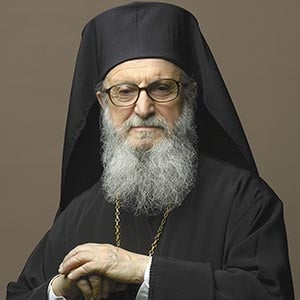 Beloved Brothers and Sisters in Christ,
We all have learned of the devastating fires in Attica, Greece that have claimed the lives of dozens of people, injured many others, and destroyed countless homes and properties. We are filled with agony and pain as we watch the horrifying images and hear the tragic stories coming from Greece.
Beloved Brothers and Sisters in Christ,
We all have learned of the devastating fires in Attica, Greece that have claimed the lives of dozens of people, injured many others, and destroyed countless homes and properties. We are filled with agony and pain as we watch the horrifying images and hear the tragic stories coming from Greece.







